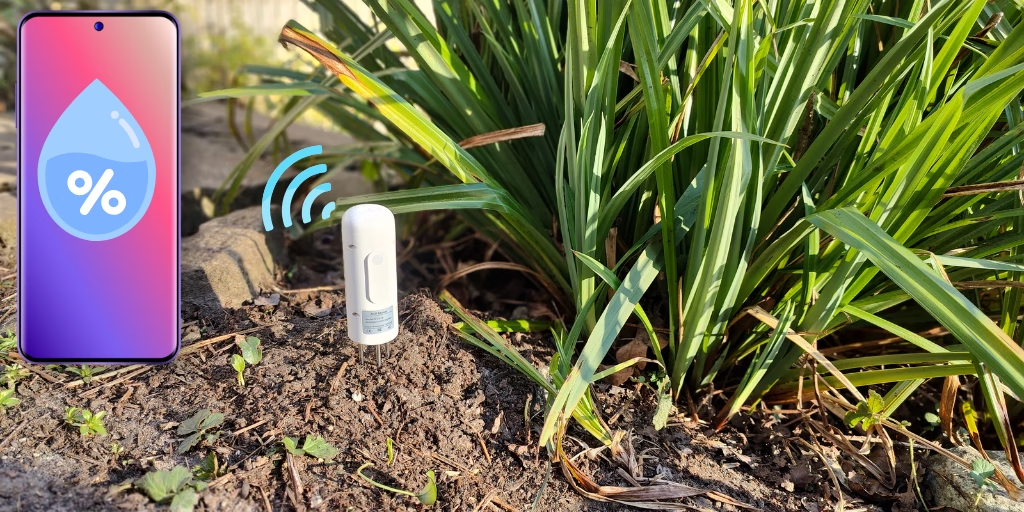Smart Soil Moisture Sensors: A Comprehensive Guide
Smart soil moisture sensors are devices designed to measure the water content in soil. They usually provide near real time data about moisture levels, helping determine when and how much to water plants. By integrating with smart home systems or smartphone apps, the sensors offer remote monitoring and automation triggering capabilities.
Some models go beyond basic moisture detection and also measure temperature, sunlight, and soil nutrients, providing a complete picture of soil conditions.
How Are Smart Soil Moisture Sensors Used
Smart soil moisture sensors are versatile and can be used in a variety of contexts, including:
- Home Gardening: Ideal for maintaining houseplants and garden beds.
- Commercial Agriculture: Large scale farms use the sensors to monitor soil moisture to optimise irrigation schedules.
- Landscaping: Landscapers use the sensors to maintain lawns and parks.
- Greenhouses: Provide precise soil moisture monitoring for indoor plants that require specific growing conditions.
Soil moisture sensors are very easy to install: simply place them into the soil, connect it to a compatible app, and begin receiving data. The data they send can then be used with irrigation systems to automate watering based on soil conditions.
Why Are Smart Soil Moisture Sensors Good
Soil moisture sensors offer a number of benefits:
- Water Conservation: Prevent overwatering and save resources, benefiting both the environment and your wallet.
- Healthier Plants: Provide plants with the right amount of water, avoiding issues like root rot or dehydration.
- Convenience: Receive alerts and integrate with irrigation systems for automated watering
- Customisation: Tailor soil moisture thresholds to meet the needs of specific plants or soil types.
Types of Smart Soil Moisture Sensors
There are a number of different technologies used to measure soil moisture:
- Capacitance Sensors: Measure the soil’s ability to hold an electric charge. Usually cheaper than other technologies, effective for general use
- Resistance Sensors: Assess electrical resistance, with lower resistance indicating higher moisture levels
- Time Domain Reflectometry (TDR) Sensors: Highly accurate, ideal for professional and scientific applications
What to Consider Before Buying
If you’re in the market for a smart soil moisture sensor, keep in mind:
- Compatibility: Ensure the sensor works with your existing smart systems, if you want to have automations and centralised management
- Data Insights: Look for devices that offer detailed trends and analysis over time. Most soil moisture sensors will do this
- Battery Life: If you have lots of sensors spread over a large area then a long battery life will probably be required. Check the expected battery life of the senor to ensure you won’t be changing batteries every five minutes. Built-in rechargeable batteries can reduce battery waste, be cautious about using your own rechargeable batteries
- Durability: Outdoor sensors need to be weather resistant. Ensure a suitable IP rating. Make sure the IP rating is for both the sensor casing and the probe.
- Range: Consider the connectivity range.
- Cost: Prices vary considerably depending on features, accuracy etc of the sensor.
- Additional Features: Decide if extras like temperature or soil nutrient monitoring are required.
Emerging Trends in Smart Soil Moisture Sensors
Smart soil moisture sensors are always evolving, with innovations like:
- IoT Integration: Sensors connect with various IoT systems
- AI and Machine Learning: Predict watering needs based on weather and soil data.
- Solar Powered Sensors: Reduces how often batteries have to be changed. Low maintenance options for outdoor use.
Final Thoughts
Whether you’re a home gardener or a farmer, smart soil moisture sensors provide useful data that help keep plants healthy, reduce water waste, and cut down on upkeep.





